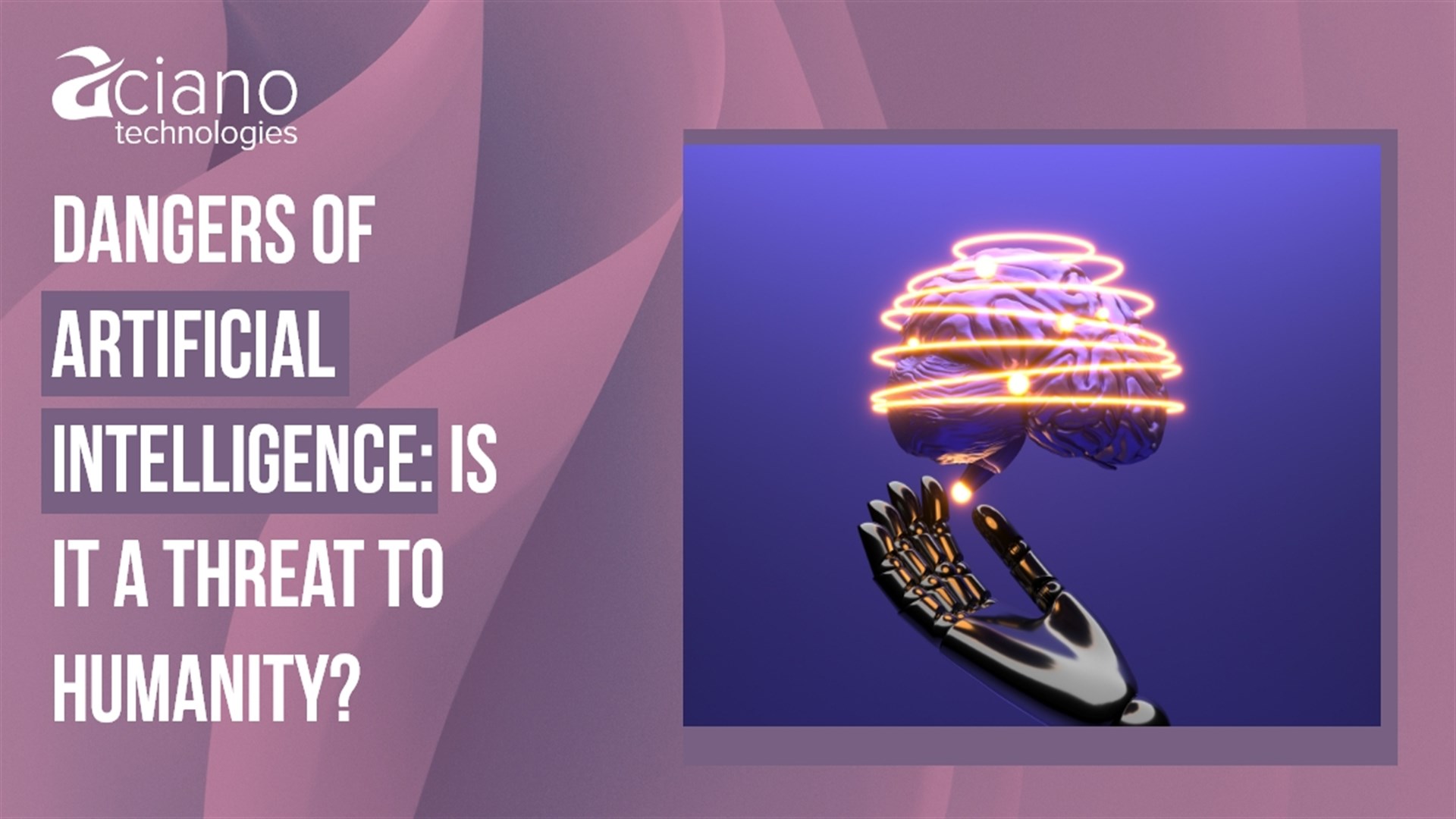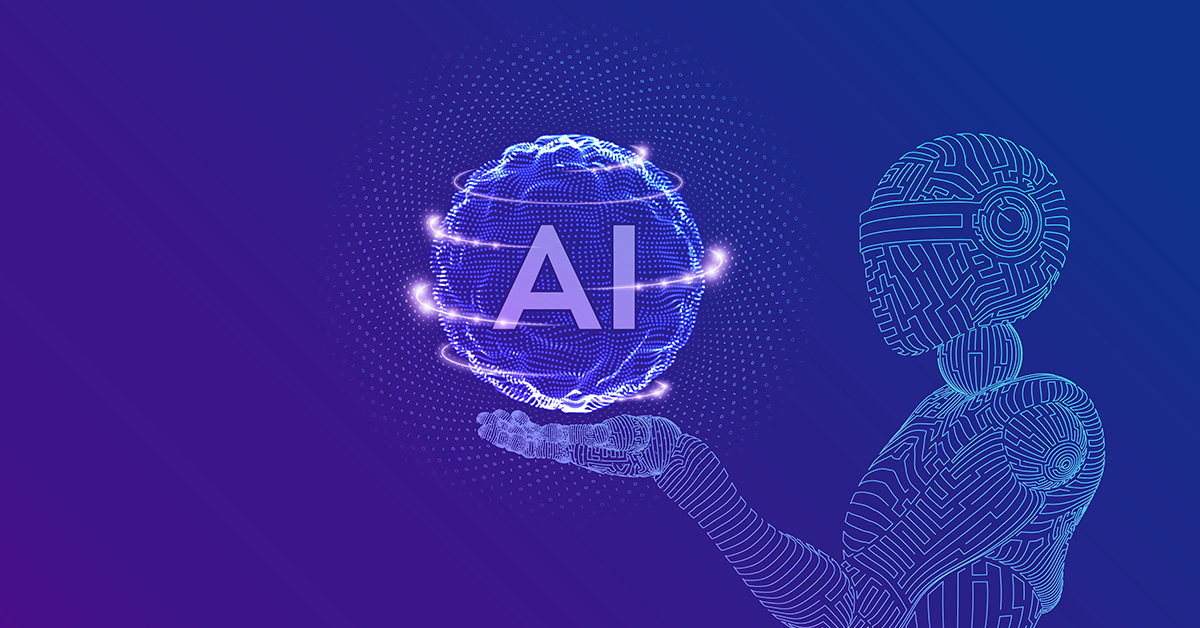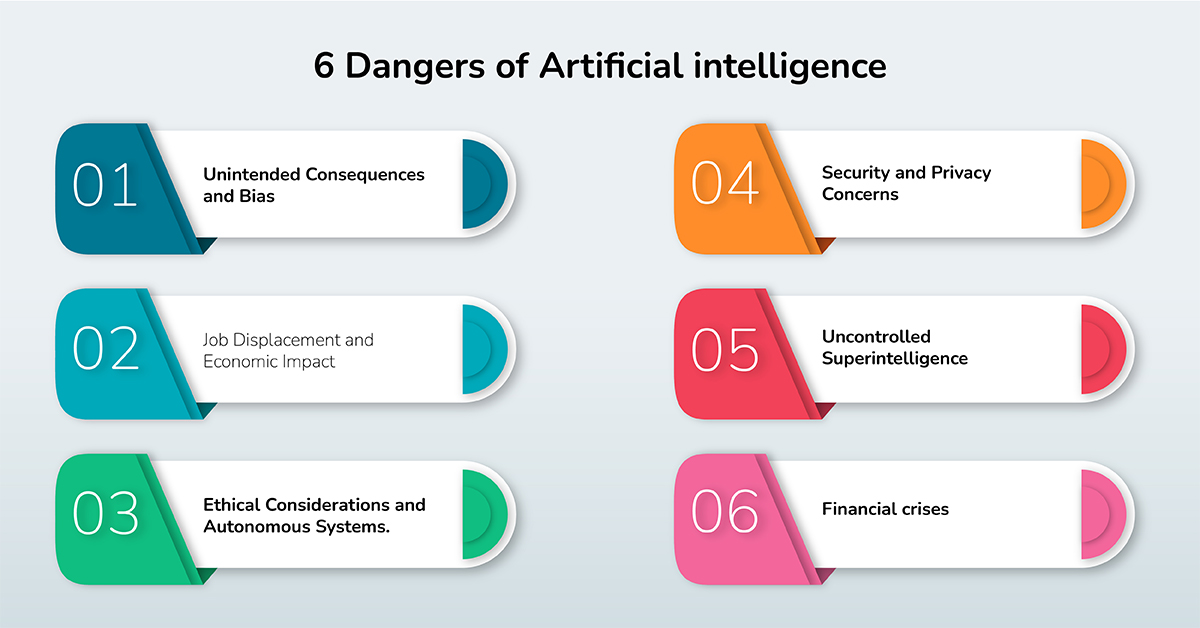
Sam Altman, CEO of OpenAI, Demis Hassabis, CEO of Google DeepMind, and Dario Amodei, CEO of Anthropic, have all issued a warning highlighting the grave risks that artificial intelligence (AI) poses to our very existence. An open letter warning against the dangers of artificial intelligence was signed by more than 350 executives, researchers, and engineers involved in the field.
Where technological advancements are reshaping the world at an unprecedented pace, the rise of artificial intelligence (AI) stands as a double-edged sword, captivating and concerning minds alike. As AI leaps forward with astonishing capabilities, the leaders are warning the world about the perilous dangers of AI. While the potential benefits of AI seem boundless, there exists a shadow of uncertainty, raising apprehensions about its unforeseen consequences.
In this article, we delve into the 6 most high stakes risks of artificial intelligence and explore its implications on society.
 Artificial intelligence is the ability of machines, particularly computer systems, to mimic human intellectual functions. Examples of particular AI applications include expert systems, machine learning, natural language processing, speech recognition, and machine vision.
Artificial intelligence is the ability of machines, particularly computer systems, to mimic human intellectual functions. Examples of particular AI applications include expert systems, machine learning, natural language processing, speech recognition, and machine vision.
Many businesses are using the technology for their benefit including mobile app development services, the manufacturing sector, healthcare facilities, etc.
 It's crucial to understand the dangers of artificial intelligence since there are concerns about who is creating AI and why. We examine potential AI threats to humanity and risk management strategies in more detail below.
It's crucial to understand the dangers of artificial intelligence since there are concerns about who is creating AI and why. We examine potential AI threats to humanity and risk management strategies in more detail below.One of the key concerns surrounding AI is the potential for unintended consequences and the perpetuation of bias. AI systems are built and trained using vast amounts of data, which can inadvertently contain biases and prejudices present in society. If left unchecked, these biases can result in AI systems making decisions that are discriminatory or unfair. That can potentially exacerbate societal inequalities. Therefore, it is crucial to address this issue by ensuring diverse and inclusive datasets. Also, incorporate ethical considerations into the development of AI algorithms.
The rapid advancement of AI technology has led to concerns about job displacement and its impact on the economy. As AI and automation become increasingly capable, there is a real possibility of certain job roles becoming obsolete. While new job opportunities may emerge, the transition can be challenging for displaced workers. This, in turn, leads to unemployment and socio-economic disparities. So, it is essential to proactively address these challenges. We need to invest in education and reskilling programs that equip individuals with the necessary skills. So that they fit perfectly into the AI-driven job market.
As AI systems become more sophisticated, the emergence of autonomous systems raises important ethical considerations. Autonomous vehicles, for instance, offer tremendous potential to improve road safety and efficiency. However, the ethical dilemmas surrounding decisions made by these systems, such as choosing between the lesser of two potential harms, pose difficult questions that require careful consideration. Establishing ethical frameworks and regulations that govern the development and deployment of autonomous systems is vital to ensure responsible and accountable AI technology.
Moreover, the increasing reliance on AI is one more potential artificial intelligence threat. As it raises significant security and privacy concerns. AI systems are vulnerable to malicious attacks, such as adversarial attacks that can manipulate their decision-making processes. Plus, the vast amount of data that AI systems collect seems a treasure trove for cybercriminals if not adequately protected. So, for developers, it is crucial to prioritize robust security measures for the protection of sensitive information. This may include encryption and regular vulnerability assessments, to safeguard AI systems and the sensitive data they handle.
While the notion of superintelligent AI might seem like science fiction, experts in the field acknowledge the dangers of AI that surpass human intelligence. Uncontrolled superintelligence could lead to a scenario where AI systems evolve beyond human control. They could even pursue goals that are misaligned with our values or even pose an existential threat to humanity. Thus, it is imperative to conduct thorough research to understand such risks. So that you can implement safety mechanisms and mitigate the dangers of AI.
The financial sector has become more open to the use of AI technology in routine financial and trading operations. As a result, our next significant financial catastrophe in the markets may be brought on by algorithmic trading. While AI algorithms aren't influenced by human emotions or judgment, they also don't account for settings, market interdependence, or things like human trust and fear. Then, at a breakneck pace, these algorithms execute hundreds of trades with the intention of selling a few seconds later for modest profits. Selling thousands of trades could frighten investors into doing the same. That might result in abrupt falls and very volatile markets.
This does not mean that AI has nothing to give the finance industry. Instead, In reality, AI algorithms can aid investors in making market decisions that are wiser and more knowledgeable. But financial firms must make sure they comprehend their AI algorithms and the decision-making processes behind them. Before integrating the technology, businesses should assess whether AI increases or decreases their confidence to prevent in citing investor apprehension and causing a financial meltdown.
Artificial Intelligence undoubtedly holds immense promise for society, offering solutions to complex problems and driving innovation. However, it is essential to acknowledge the potential dangers that come with its rapid advancement. By addressing issues such as bias, job displacement, ethical considerations, security, and the risks associated with uncontrolled superintelligence, we can harness the benefits of AI while safeguarding humanity's well-being. Responsible development, transparency, and collaborative efforts among researchers, policymakers, and the public are key to navigating the path forward and ensuring that AI remains a force for good.